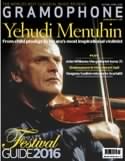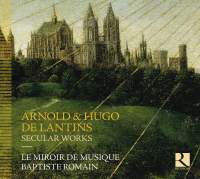Texte paru dans: / Appeared in: |
|
|
Outil de traduction (Très approximatif) |
|
|
Reviewer: Fabrice Fitch
Hugo and Arnold de Lantins are somewhat shadowy figures (possibly brothers, though this is not proven) who rubbed shoulders with the young Dufay in Italy and left a small but significant body of music.
That this provides a stylistic point of reference for their more famous colleague has long been recognised by scholars, but this recording compellingy demonstrates its intrinsic quality. Working within the formal conventions of the poetry of the time, their music breathes restrained elegance and poise where the young Dufay is more often outgoing and showy. This recital focuses principally on their secular music, although the few sacred examples are just as impressive. Arnold’s Song of Songs setting Tota pulchra es is one of the most immediately appealing things on the disc. Hugo is perhaps better known on account of the obscene acrostic of his rondeau Plaindre m’estuet, but his mellifluous setting of it is another standout, the all-vocal performance here every bit as communicative as that from Gothic Voices many years ago (Hyperion, 12/88), albeit entirely different in approach.
Le Miroir de Musique is one of a number of young groups led by an instrumentalist but combining voices as well. These ensembles make the case for instrumental participation in this repertory as compellingly as Gothic Voices did for all-vocal performance, principally by being very discriminating in their choices for individual pieces. Gone is the ‘everything but the kitchen sink’ approach of 40 years ago; gone, too, is the mangling of poetic forms to showcase instrumental virtuosity (not to say instrumentalists’ egos).
Not that these young musicians are slouches technically: an intricate unison line shared on recorder and vielle (in Amour servir) is flawlessly executed. The singers, as I’ve suggested, are on a par with them, the intricate cross-rhythms of Je suy exent being negotiated with distinction. This is one of the most satisfying 15th-century recordings I’ve heard in a while: specialist repertory that doesn’t deserve to be.
|
|
|
|
|
|
Cliquez l'un ou l'autre
bouton pour découvrir bien d'autres critiques de CD |
|




